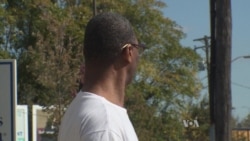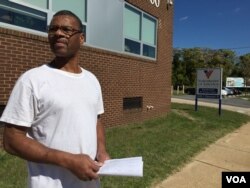Greg Nelson, 58, stands at the bus stop as diesel trucks laboriously climb a hill and cars pass him by. Bus 35 is late. His permission slip is in his hand. He has one hour to get to the pharmacy and back. Bus tokens, something new and foreign to him, are in his pocket.
In 2012, Nelson was driving to a drug deal when police stopped him. They found 55 grams of heroin with a street value of $6,000 in his car. He had no weapon nor any prior conviction. On federal conspiracy and distribution charges he was sentenced to four years in prison.
"Any time is a long time when you are incarcerated," he said.
Nelson leaves prison a year early, though — on October 30 — because of a recent decision by the U.S. Sentencing Commission. In the biggest prisoner release in history, federal sentencing guidelines have been reduced for non-violent drug offenders. It’s a move to lower harsh sentences for non-violent crimes and to ease prison overcrowding. Six-thousand will leave by early November. In the next few years, another 40,000 will get early release.
FAMM
In the 1990's Julie Stewart's brother was sentenced to five years for growing marijuana in Washington — a state that has now legalized it. She started the non-profit Families against Mandatory Minimums.
“We have just incarcerated, incarcerated, incarcerated because it’s easy," she said. "And it makes people feel good but it doesn’t actually make us safer and it’s really really expensive. ”
Warning from US attorneys
But not everyone agrees. According to FBI figures, US crime has dropped 12 percent over the past five years. Some say that was due in part to the tough sentencing guidelines. The attorneys who prosecute criminals predict violent crime will rise again with the shorter sentences.
"The recidivism rate among offenders nationwide is nearly 77 percent," says Steve Wasserman, treasurer of the National Association of Assistant US Attorneys. He cites a study from the National Institute of Justice, saying "It’s virtually guaranteed a large percentage of the individuals, the inmates being released, are going to reoffend."
Non-violent or violent
Julie Stewart, though, points out the offenders being released are non-violent drug criminals whose sentences don't fit the crime.
"When I was a kid," she said, "Murderers went to prison for 20 years, not the people growing marijuana or selling drugs on the street corner."
Wasserman counters, "Drug dealers by definition cannot go to the police when their drugs are stolen, So, the idea that drug traffickers are engaged in some innoculous, non-violent act is just false. These are individuals that habitually carry firearms."
Volunteers of America halfway house
Volunteers of America Chesapeake runs the residential re-entry house in Maryland where Greg Nelson lives. Program Director Jennifer Masslieno is busier than she's ever been in her career due to the thousands being released. She can house 148 men and women and manage 50 on home confinement. She has one slot left in her residential capacity and is 16 over her limit on home confinement. She's also down two case workers. But she worries about the inmates who won't go through transitional housing.
"There’s a certain population that’s going to be released, and they’re going directly to the community," she said. "So they aren’t going to have re-entry services. I think every offender should have re-entry services, whether thay come from a high-level security or a low-level security facility."
Masslieno's center counsels inmates on jobs and housing — inmates stay there before they get total freedom.
“They need to have the tools to be successful, and not go back to the lifestyle that they previously went through prior to incarceration,” she said.
Greg Nelson says his time in the center has prepared him for release and to be successful without drugs.
"They introduce you back into society, but they do it slowly," he said. " I think the biggest thing I learned was to separate what I want from what I need. What I want doesn’t matter, as long as I have everything I need."














